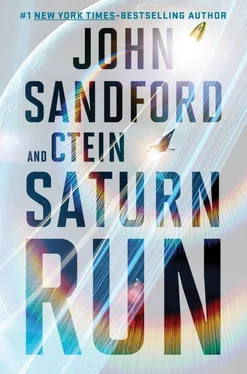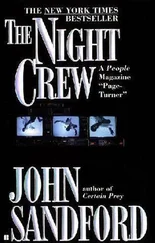Zhang’s mood turned grimmer than it already had been. “Those ben dan and their damned simulations. The plasma sheath was nowhere near wide enough to protect the upside tanks. We’re fortunate the whole ship didn’t burn up.”
He looked around the half-empty bridge: another brainstorm of the groundpounders in Beijing. The decision-makers had decreed that stripping the ship of all nonessentials, both people and equipment, was the path to beating the Americans to Saturn. By the time the designers had gotten done repurposing the Martian Odyssey , they’d turned it into one of the most automated ships that had ever flown. The Celestial Odyssey could get by with half the operational crew of a typical ship of its size.
It was a damned stupid idea, in Zhang’s judgment. That judgment, he’d kept to himself. Another tradition of the Yuhanguan Corps: you not only followed the orders that were handed down, you made believe you were enthusiastic about them. Once you were in space, you could pretty much do what needed to be done, but until you got there…
Zhang knew it was the same for the Americans who went to space, and the Indians and the Brazilians, when it came down to it. It wasn’t culture, it was politics.
Those same politics had him here at Saturn. He’d seriously considered turning the assignment down. He’d been told the choice was entirely his. What they hadn’t had to say was that if he did turn it down, his career would come to an end. He’d shrugged, maintained his placid exterior, and thanked them for the glorious opportunity.
Well, it was a glorious opportunity, and it had gotten him to a part of the solar system he never in his wildest dreams imagined that he would see. However, it would be nice to live long enough to enjoy the memories, and he was starting to have some concerns about that.
Zhang said, “Well, nothing to be done for it. Mr. Cui, see how much repair work the crew can manage in the next two days and send me a report. You have the bridge. I’ll be in my office.”
He pushed himself free of his chair, his weightless bulk moving easily across the bridge and down to his private office. Once settled at his desk, there were plenty of other reports to be studied.
The external tank situation was, indeed, bad. Beijing had been crazy to order that desperate midcourse boost. He’d been even crazier to pretend to believe their reassurances that the aerobraking maneuver would come off without a hitch. But their best experts had been so confident, ben dan every one of them, and he wasn’t going to disobey a direct order on nothing more than a sinking feeling in his stomach.
They’d cut free the downside reaction-mass tanks. Those would’ve burned away during aerobraking anyway and probably taken the whole ship with them. That lightened the ship, but cost them a third of their storage capacity. They still had the three upside external tanks, plus the internal tanks. That would provide them enough delta-vee capability to get home in a little over two years. It was well within the safety margin of life support and supplies. Control thought it an entirely workable plan that would get them to Saturn nearly a month sooner. They might even still beat the Nixon if the Americans suffered more bad luck. Zhang suspected the Nixon ’s troubles involved more than luck.
Except, Beijing’s plan hadn’t worked well enough. The Americans had beaten them to Saturn by over a week. The preliminary damage report stated that the aerobraking maneuver had irreparably breached one of the external tanks; maybe the other two could be repaired. The downside bay doors looked to be inoperable; half their complement of runabouts and service eggs were useless unless they could get those doors open. That was going to substantially slow down refilling the reaction-mass tanks. He hoped the repair team could do something about the doors, and do it quickly.
Worst of all, they hadn’t arrived at their destination, not really. They’d still need to make another pass through Saturn’s atmosphere before they’d be able to match orbits with the alien operation.
Zhang jotted off an order to have the ship’s stores re-inventoried and a rationing schedule drawn up, in case things got worse. He was fairly certain they weren’t going to get better.
He and the management team ran on stims, and by the next morning, had a better idea of the range of their problems.
“The external survey crew says at least one of the external tanks can be repaired,” Cui said. “That’ll take at least a week. The second tank we’re not sure about yet, but I think we can do it.”
“We have to do it,” Zhang said, “so let’s enter that as repairable.”
The third tank was a complete loss.
“We can’t do anything with the tanks before our next pass through the atmosphere. Since the bay doors don’t appear to be damaged, most likely heat warping has jammed the releases. Let’s get Maintenance to focus on that.”
More stims, and a few hours’ sleep, and another day.
The morning brought an extended contact with Beijing. He’d started it with as complete a report as he could provide, including specific data that showed they’d hit Saturn’s atmosphere precisely as the groundpounders had recommended: and they’d still been badly damaged.
Mid-morning had brought a long message from the chairman and his scientific counsel. That had been an exercise in tap-dancing, everybody agreeing that nobody was to blame for anything, that everything had been done according to the best protocols.
That ended with the chairman turning to the screen and saying, “Zhang, you know how much I wish I could be there with you. I have nothing but admiration and respect for the way you and your crew have conducted yourselves….”
When he’d finished, Zhang thought that he’d actually sounded sincere, and that he may actually have been.
Midday brought the inventory reports.
Zhang looked them over glumly. On the plus side, they weren’t going to run out of food or water. Hydroponics could provide them with a nutritionally adequate diet for an indefinite time. Oxygen and water could be regenerated. The problem was that spaceships didn’t have perfectly closed recycling systems; some chemicals were consumables they couldn’t produce on board.
Zhang supposed the mission planners had done well. They’d taken a ship designed for multi-month trips and fitted it to support a crew for years. Since they had no idea what would be found at Saturn or how long it would take to explore, they’d been able to squeeze in almost five years’ worth of life support. There was a good fifty percent safety margin over the optimum mission duration built into that.
The mission, though, was no longer running at anything like the optimum profile. If they couldn’t get back to Earth in three years, max, they’d be in trouble. They really needed the two salvageable external reaction-mass tanks to hold through the next aerobraking.
Zhang drifted from his office down the passageway to the bridge. Seventeen months in zero-gee had been a hard regimen to live with. He’d been skipping days in the gym while confronting their difficult situation, and the ship’s physician was going to beat him up if he didn’t get back on schedule.
He’d told the doc, “If the aerobraking doesn’t work, I’m going to die. So are you. Why spend our last moments worrying about whether our hearts would be healthy back on Earth? Once we know we’re going to survive, I swear, it’ll be an hour a day, every day.”
“I don’t believe you… sir,” the doctor said.
“Remind me to have you pushed out the air lock for insubordination,” Zhang said.
Now he floated into the bridge, strapped himself into the captain’s chair, and brought up the status screen. Everyone at their stations? Yes. All sections reporting everything that could be locked down, was locked down? Yes, except for the maintenance team in the downside bay. They’d been working on the door mechanisms and reporting good progress.
Читать дальше








